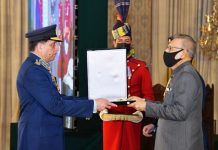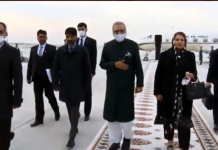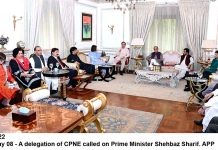ISLAMABAD: Indian Home Minister Rajnath Singh left the South Asian Association for Regional Cooperation (SAARC) Interior Ministers’ meeting halfway through after being unable to respond to his Pakistani counterpart Chaudhry Nisar Ali Khan’s comments on Thursday.
Singh indirectly accused Pakistan of sponsoring terrorism. But when Interior Minister Nisar took offence on remarks against Pakistan, Singh found it difficult to digest. Nisar called for respecting the fundamental rights of the people and stressed that legitimate freedom struggles should not be suppressed in the name of the fight against terrorism.
He called upon the countries from the region to differentiate between terrorism and freedom movements, sanctified by the UN Security Council, and observed that violence against the freedom fighters in a disputed territory under Indian occupation was state-sponsored.
The interior minister also highlighted how Pakistan itself was one of the biggest victims of terrorism. He said, “Instead of engaging in a blame-game and taking swipes at each other, we should take time out to reflect and sit together to try and work out the problems and reservations that we might harbour towards each other.”
He said that it was not Pakistan that closed its doors to talks. “Pakistan is ready to engage in any dialogue process based on mutual respect and dignity with no strings attached. It is for those who have put conditions and sub-conditions for initiating dialogue to reconsider and realign their position.”
He said that unlike India’s claims, terrorist activities were not restricted to India, Afghanistan or Bangladesh. Scores of terrorist attacks had taken place in Pakistan and were equally condemnable, if not more so. He specifically mentioned the attacks on Army Public School in Peshawar, the Bacha Khan University in Charsadda and the Gulshan-i-Iqbal Park in Lahore. He added that such incidents could not be ignored and the perpetrators of these attacks must be apprehended and brought to justice.
His remarks came at a time when tensions are running high between the two nuclear-armed neighbours over fresh unrest and killings by Indian forces in Kashmir. His remarks rendered Singh speechless who chose not to respond but leve the conference unfinished instead.
The strains in relations were apparent when Nisar and Singh came across each other for the first time. Nisar was receiving the guests at the entrance to the conference’s venue when Singh arrived and the two did not even shake hands properly.
In his address to the meeting, Singh called for tough action against terrorism and countries supporting it. “Terrorists should not be glorified as ‘martyrs’. There is no good or bad terrorism. Terrorism is terrorism,” he said.
Both ministers skipped the luncheon arranged for the participants of the SAARC conference. Addressing the media later, Nisar said that he had received a message from the Indian minister asking whether he (Nisar) would be coming to the lunch. Nisar said that he excused himself as he had to attend an important meeting at the prime minister house. Singh, however, did not stick around longer and left the venue without attending the final session of the conference.
Nisar observed that equating the movement for Kashmir’s liberation with terrorism was ‘dishonesty with history’. He felt that SAARC members could not be hostage to a certain country’s agenda. He said, “If somebody refers to some specific dates and incidents, then we have the right to come up with our own assessment of blatant foreign intervention and the influx of terrorism in Pakistan from across the border.”
Meanwhile, SAARC ministers condemned terrorism in all its forms and manifestations, calling for collective efforts to fight this menace and emphasised that terrorists should not escape prosecution. The meeting highlighted the need for identifying practical solutions to challenges such as cybercrime and transnational organised crime, to ensure safety and security for socioeconomic growth and provide a secure future for the youth, women and children.
The meeting also called for strengthening SAARC regional conventions on the suppression of terrorism and the additional protocol on mutual assistance in criminal matters and on drugs and psychotropic substances.
Prime Minister Nawaz Sharif, who was the chief guest at the inaugural session of the conference, said that at the national level, remarkable gains had been made against terrorists through Operation Zarb-e-Azb and the National Action Plan.













